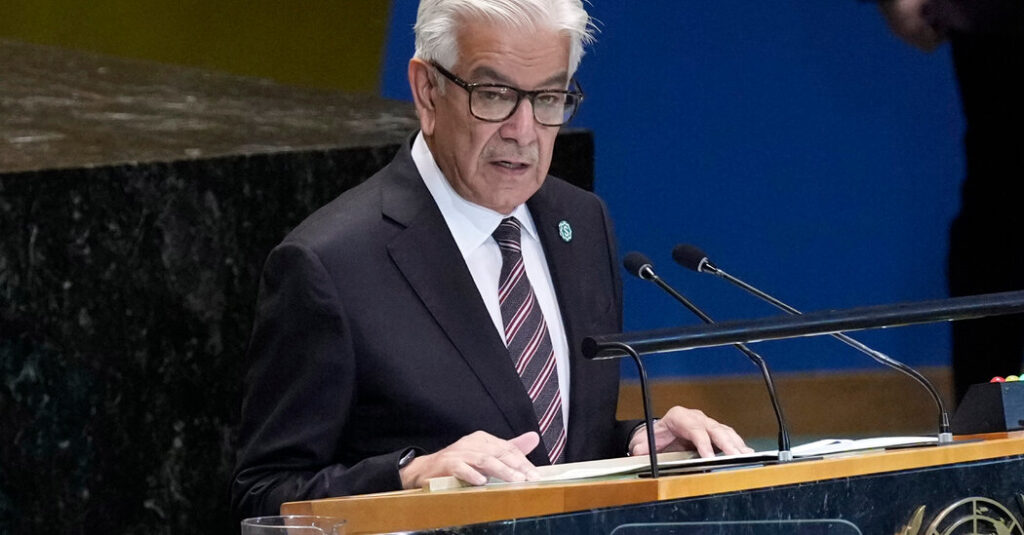On Friday, Pakistan’s defense minister stated that his nation is not involved in a recent terrorist attack that claimed the lives of 26 individuals in Kashmir, a region claimed by India. He emphasized the need for an international inquiry into the incident.
In his interview, Khawaja Muhammad Asif expressed that Pakistan is “open to collaborating” with any international authorities that conduct an investigation.
His comments seemed intended to ease the growing tensions with India after militants attacked a group of tourists on Tuesday near Pahalgam, a town located in southern Kashmir. This incident marks one of the deadliest terrorist acts in Indian-administered territory in recent years.
Following the attack, India rapidly took actions against Pakistan, which also has claims over part of Kashmir, including closing border crossings and halting a vital water agreement. Indian officials suspect that at least two Pakistani nationals were involved in the attack.
Mr. Asif asserted that India was exploiting the situation following the terrorist attack to justify suspending the water treaty and for domestic political gain. He claimed that India was taking punitive measures against Pakistan “without any proof, without any investigation.”
Pakistani authorities have reached out to the Trump administration for assistance in mediating the conflict.
“We do not desire a war to escalate, as such an escalation could lead to a catastrophe for this region,” Mr. Asif warned.
The last significant militant attack in the Indian-administered part of Kashmir occurred in 2019, resulting in numerous fatalities among Indian security forces. India responded to that attack with airstrikes on Pakistan.
U.S. officials have not yet linked this week’s assault in Kashmir to any specific group, although a lesser-known group called the Resistance Front has purportedly claimed responsibility.
The United States and other countries remain cautious about the repercussions of the attack. The loss of life has led to swift actions from India, raising concerns among Western officials about the potential for escalating tensions between the two nuclear-armed nations.
Nonetheless, officials from the Trump administration have expressed their support for India. Vice President JD Vance was in India this week, following a speech by Tulsi Gabbard, the director of national intelligence, emphasizing the need for global peace.
Both nations have taken steps to close border points and have acted against each other’s diplomatic staff. Indian Prime Minister Narendra Modi stated this week that his country would hold accountable “each terrorist and their supporters.”
“Terrorism will never break India’s spirit,” he added.
Indian authorities claim the group that took credit for the attack is affiliated with Lashkar-e-Taiba, the organization responsible for the 2008 Mumbai attacks.
Mr. Asif rejected this accusation, asserting that Lashkar-e-Taiba is “no longer operational” and lacks the capacity to plan or execute attacks from areas controlled by Pakistan.
“They are finished; there is no infrastructure for them in Pakistan,” he stated. “Any remnants are contained, with some under house arrest and others in custody. They are not active at all.”
However, U.S. officials have noted that Lashkar-e-Taiba has shown recent signs of regrouping, and its leader has remained visible in Pakistan.
Mr. Asif suggested that the attack might have been executed by local separatist factions in Kashmir advocating for greater autonomy.
He added that Pakistan does not endorse separatist movements in India, though some officials have indicated this stance does not apply in Kashmir. Last week, Pakistan’s military chief referred to Kashmir as the country’s “jugular vein” and declared, “we will not abandon our Kashmiri brethren in their courageous fight against Indian occupation.”
Mr. Asif also insinuated, without providing evidence, that the incident could potentially be a “false flag” operation by the Indian government intended to incite a crisis.
According to Asif, Pakistan gains nothing from attacking civilians. He contended that the Indian administration is leveraging the attack to solidify domestic support and to withdraw from the water treaty.
The Indus Waters Treaty, which was brokered by the World Bank and signed by India and Pakistan in 1960, provides a framework for water usage. If India proceeds to suspend the treaty, it could limit the water flow into Pakistan, affecting agricultural and drinking water supplies.
Mr. Asif, who has previously held the role of Pakistan’s water resources minister, stated that India has been trying to opt-out of the treaty for the past decade, which has traditionally ensured stability in the area.
“They were fabricating justifications. They were inventing issues that didn’t exist,” he remarked. “Now they have discovered a reason to withdraw from this agreement.”
Mujib Mashal contributed reporting from New Delhi.


